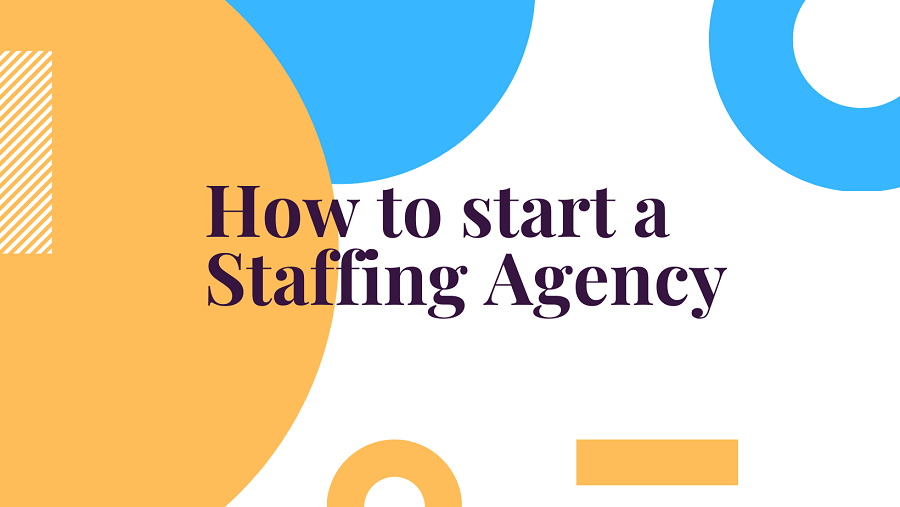The staffing industry has been growing steadily over the past decades, fueled by companies’ need for temporary and flexible work arrangements. In the United States alone, staffing and recruiting is a $150 billion market. With the right business model and execution, a staffing agency can be a profitable entrepreneurial venture. Here is an in-depth guide on how to start your own staffing agency.
What is a Staffing Agency?
A staffing agency matches job seekers with companies needing specific temporary or permanent workers. Staffing firms handle all aspects of the hiring, payroll, benefits, compliance, and retention. There are several types of staffing agencies:
- Temporary/contract staffing helps companies fill positions for a limited time. This may be for seasonal needs, employee absences, or special projects.
- Direct hire/permanent placement staffing helps companies recruit candidates for full-time permanent roles. They may specialize in certain functions like accounting or technology.
- Professional search firms focus on placements for executive-level and specialized positions.
Steps to Starting a Staffing Agency
Launching a successful staffing agency takes careful planning and preparation. Here are the key steps:
Research Extensively
Gather information to make informed business decisions as you start your staffing agency. Useful research activities include:
- Study the various types of staffing agencies and services they offer. Identify areas with potential.
- Assess the competitive landscape in your geographic area. Identify unmet demands for either industries or skill sets.
- Look for emerging trends and changes in the labor market. Identify gaps you can fill.
- Learn about industry regulations from the IRS, Department of Labor, and employment commissions. Know employment laws.
This research will shape your business model and messaging.
Create a Business Plan
Every new business needs a business plan to transform an idea into reality. Your business plan should outline:
- Company overview and mission statement
- Services offered – will you provide temporary, temp-to-hire, or permanent placement? Specialize by industry? Offer payroll and compliance services?
- Target customer profiles – ideal prospects for your services
- Market analysis – size, trends, competition, and opportunities
- Operations plan – how you will recruit, interview, hire, compensate, manage workers
- Financial projections – costs, expected revenues, profitability timeline
- Marketing strategy – how you will promote your services and unique value
A clear business plan is crucial for success and securing funding if needed.
Obtain Licensing and Insurance
Don’t neglect the formalities of establishing your business.
- Choose and register your business name.
- Obtain your state tax ID, employer ID from IRS, and any required local licenses.
- Get business insurance like General Liability, Professional Liability, and Workers Compensation insurance.
The right licenses and insurance will protect your company as you start hiring.
Set Up Your Back Office Systems
An infrastructure to support your core staffing functions is vital. Implement:
- An applicant tracking system to organize and track candidates.
- A database to maintain job seeker resumes and profiles and match them to open roles.
- Payroll processing systems to pay contract workers. Integrate with timekeeping software.
- Accounting software to handle invoicing, accounts receivable, and taxes.
- Tools to ensure compliance with employment laws, safety standards, worker’s compensation, etc.
Having efficient processes will improve productivity as your agency grows.
Build Your Talent Pool
A strong candidate pool provides the talent for your agency to place with clients. Some options for finding job seekers include:
- Placing job board ads marketing your services to recruit applicants.
- Networking at industry events, trade association meetings and community career fairs.
- Fostering partnerships with local employment agencies, colleges, and training programs.
- Promotions and social media to increase visibility among prospective candidates.
Consider specializing in specific high demand skill sets like healthcare, technology, manufacturing, or administration early on. Focus on needs in your region. Developing niche expertise can boost authority and placement success.
Market the Staffing Agency
Generating a steady flow of client companies that hire your placed talent is critical. Marketing tactics include:
- Developing a unique brand identity and logo. Convey your agency’s special strengths.
- Creating a website detailing your services, candidate screening process, and value proposition.
- Search engine marketing through SEO and pay-per-click ads.
- Email newsletters showcasing your available talent pool. Nurture relationships.
- Direct outreach to prospective client companies through sales calls and meetings.
- Networking through local chambers of commerce, trade associations, and events.
- Social media marketing on LinkedIn, Facebook, and Twitter to increase visibility.
Remember to focus marketing on promoting your expertise and how you help employers find great talent.
Provide Exceptional Service
The success of your staffing agency ultimately depends on building great relationships and providing outstanding service. Some best practices include:
- Taking time to thoroughly understand each client’s needs and work environment. Make accurate placements.
- Screening candidates diligently so you refer only qualified, reliable people.
- Responding promptly to calls and emails from clients and job seekers.
- Checking in regularly to ensure satisfaction on both sides of your placements.
- Striving to become a trusted partner to client companies by delivering consistent value.
The reputation and repeat business you earn through exceptional service will sustain and grow your agency.
Starting a staffing agency can be highly rewarding for entrepreneurs who do the upfront work, plan soundly, execute capably, and deliver great service. With care and effort, you can tap into the opportunities of this growing industry. Do your preparation, find an unmet niche, and focus intently on building relationships. A profitable, sustainable business could soon be supporting job seekers and employers in your area!
